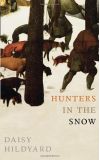
21 Aug 2013 04:08:20
When the unnamed narrator of Hunters in the Snow introduces us to her grandparents' farm, it is by way of the front porch, which doubled as her historian grandfather's study. It had a "slate roof on which a ceramic cat stalked a ceramic single-winged bird ... I do not know how the bird lost its wing." The primary themes of Daisy Hildyard's ambitious debut novel are contained in that whimsical ornament: stalking the truth about the past involves admitting that the past is incomplete, will never fly, and is indeed a made-up thing. And that not knowing is part and parcel of being a historian, hunting out on the thin ice of conjecture. After the death of the narrator's eccentric grandfather – he believed moving latrines inside was "a backward step for western civilisation" – his granddaughter, deep in her own doctorate, sorts through his papers before the farm is sold: "The whole world, to Jimmy, was a history textbook, and when I was not at home ... I was with him, in History, going as far back as I can remember." The fuzzy quality of that sentence – "going as far back" refers not to the history lesson but her own biography – is presumably deliberate, because the entire novel is similarly blurred as it dips in and out of Jimmy's parallel historical world: we are told that he favours detail over themes or theories, although later we learn that "conflict was at the heart of his theory of history".
The farm itself is robustly run by Liv, his no-nonsense wife. It is depicted with vivid clarity, the downbeat note of memoir occupying the place of narrative drive ("I became a member of the British White Cattle Society when I turned 10"). Jimmy, however, often fails to attribute his sources, or distinguish hearsay from authenticated event. This might explain why, in the manner of Casaubon in Middlemarch, his magnum opus (a seven-volume History of Modern England) consists of no more than four unsorted box-files tracing the journeys of four significant historical figures: the essential material of the novel.
This framing device creates a mise en abyme: the selections from Jimmy's unpublished works illustrate his belief that the historian should be included in the historical picture, and are further set in the context of the narrator's own mainly childhood memories. Thus the first file opens with the battle of Towton (1461) and includes a local article about the nearest pub, quoted verbatim her 10-year-old's memories of the meal they had there and of Jimmy's account of the bloody battle on the site itself and their encounter with a farmer ploughing the adjoining field. Their drive back to York is peppered with further information on Herodotus, the deaths of anonymous soldiers, and the importance of cause and effect, before the narrative veers into Sir Thomas Malory's Morte d'Arthur (a work possibly coloured by Malory's witnessing of Towton's gore), which Jimmy would recount to her as real stories, the seminal work thus distorted in turn by the narrator's own memories.
This file yields family snapshots and postcards which generate fresh recollections from the narrator – of plucking rabbits or shooting birds. These in turn dissolve into Jimmy's long account of Edward IV's return from exile and his eventual triumph in 1471 (the year Caxton printed the first book in English), apparently drawn from the 16th-century bastard text The Historie of the Arrivall of Edward IV. The interweaving of past and present is mostly abandoned, and Edward's story lacks bite to see the link with what has come before (he was the victor at Towton, but was ousted by Warwick), background reading is required, although that would presumably defeat Hildyard's aim, which is to let us share her childhood confusion.
The other files open to an account of Peter the Great's incognito passage through Europe in the winter of 1697-8, finishing up in London. Jimmy's "badly written" notes and his "poorly explained" framework merely echo the original accounts, which consist of bizarre anecdotes in which truth is lost in the "Chinese whispers" of their telling. By this time, bemused by the rambling non-narrative and gnomic statements such as "History ... is the study of missing things", this reviewer was detecting the perilous influence of WG Sebald – a suspicion heightened by the occasional photographs illustrating the text, their poor reproduction far from emulating the evanescent, poetic effect of Sebald's.
While the subsequent presentations of the black slave Olaudah Equiano's dubious 18th-century travel narrative and the story of Kitchener's death (and ensuing hoax) might be interesting in themselves, Hildyard's treatment illustrates the narrator's insistence that "all histories are a kind of fruitless pursuit". Jimmy spends his last years on the computer, and in one sense the very form of Hunters in the Snow reflects not just his own "messy and confused" work, but the infinite digressiveness of the internet, as if the entire novel had been tapped out in the Google search box. Whether it soars to new altitudes or flaps its single wing helplessly very much depends on the individual reader's patience.

